As we move into the future of online shopping, it's essential to understand what customers want and how businesses can meet their demands. Our article dives deep into the latest industry insights to help companies to thrive in a competitive market. Our analysis considers major trends so that you can make informed decisions during your e-commerce marketplace development.
Read on!
Digital Marketplace Industry
The e-commerce industry is being driven by new technological developments such as AI, blockchain, and the Internet of Things (IoT), revolutionizing how e-commerce marketplaces operate. This trend is also fueled by the proliferation of smartphones and mobile devices, which provide consumers with more convenient ways to shop online.
China leads the e-commerce business in revenue with 1.3 trillion dollars, followed by the United States with 856.77 billion dollars. With a disparity of 1.3 trillion dollars from China, Indonesia sits at the bottom of the list with 47.54 billion US dollars.
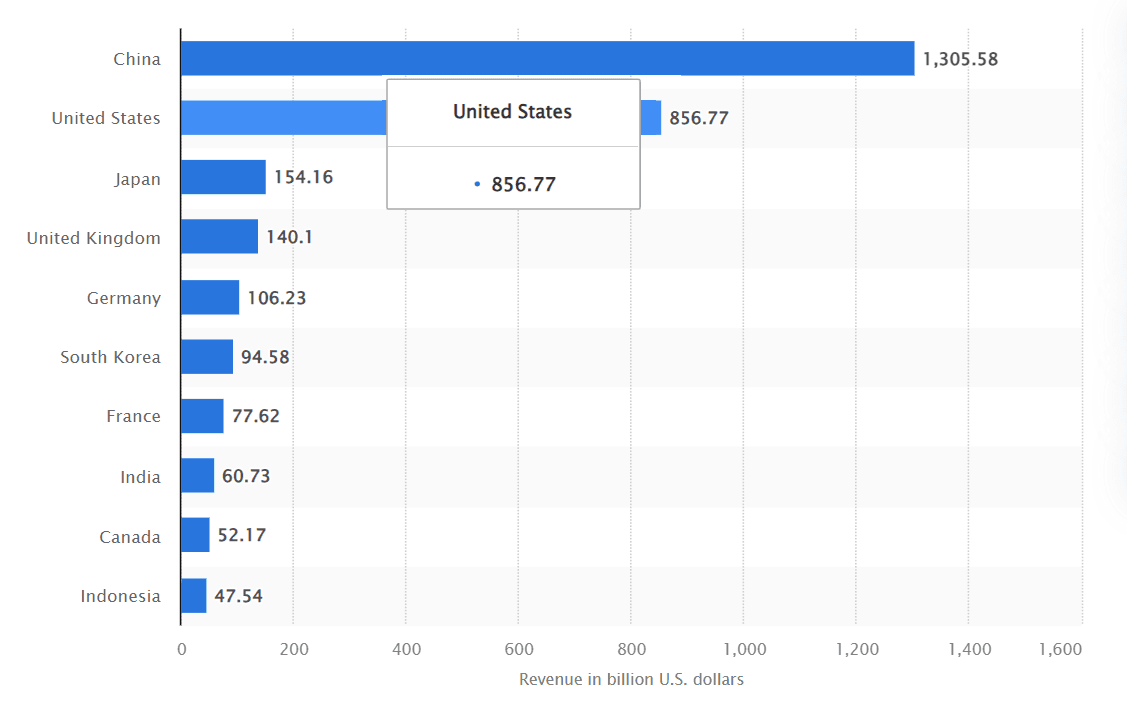 Source: Statista
Source: Statista
Since one of the biggest firms in the world is Amazon, it receives the most monthly traffic. It receives more traffic than the following three websites put together.
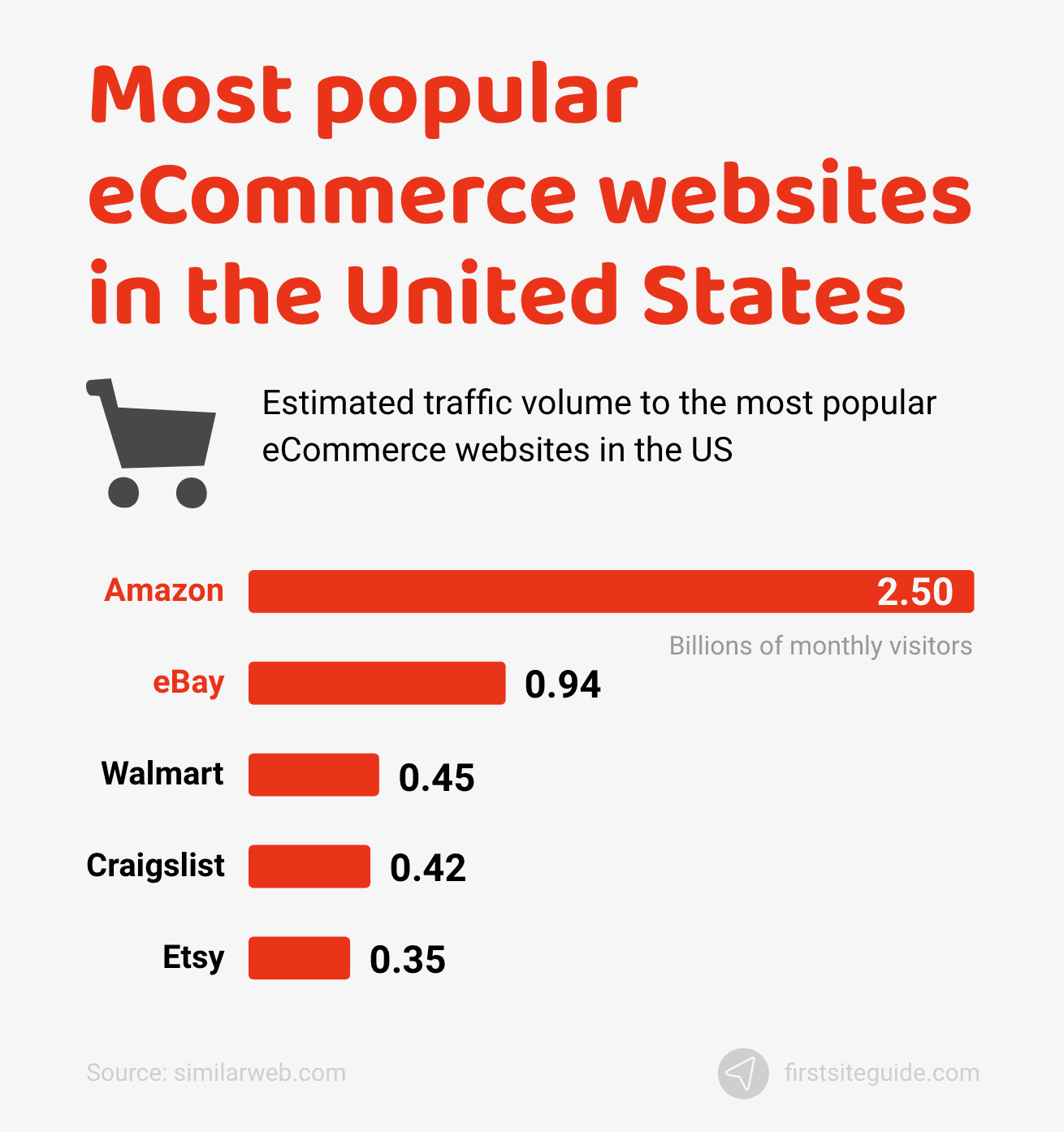
WooCommerce holds 26% of the market, making it the most reliable platform for online retail. Wix Stores holds a 13% market share, while Shopify is in second place with 17%.
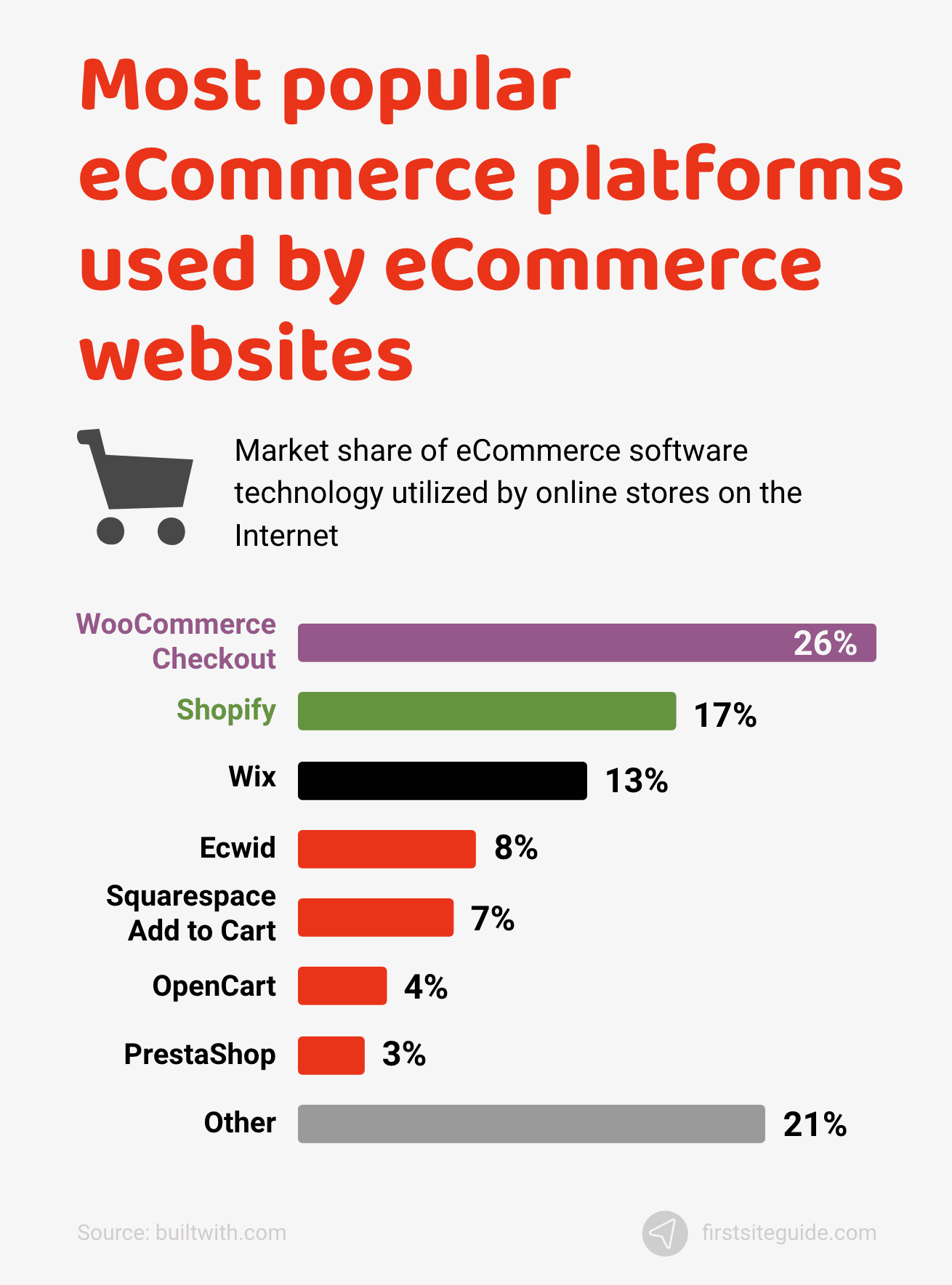
Another notable trend is the rise of social commerce, with social media platforms such as Instagram, Facebook, Pinterest, and TikTok expanding their e-commerce capabilities. As a result, many businesses are investing more in social media marketing to increase their visibility and attract potential customers.
Why Create an E-commerce Marketplace Solution
Businesses should invest in creating online marketplace solutions for various reasons.
Firstly, it provides a platform for them to tap into a wider pool of potential customers without incurring any additional advertising or marketing costs. With a marketplace, businesses can increase their exposure and visibility to a broader audience, increasing sales and revenue.
Secondly, a marketplace solution allows businesses to expand their reach beyond local markets. Unlike traditional brick-and-mortar stores, e-commerce marketplaces are not geographically confined and can cater to customers across the globe. By expanding their customer base, businesses can increase their sales and grow their brand presence on a global scale.
Thirdly, e-commerce marketplaces offer a convenient and efficient way for customers to compare products, services, and prices. By providing customers with comparative information, businesses can improve their sales through up-selling and cross-selling. Moreover, customers can access products 24/7, regardless of time zones or geographic location. This ensures businesses can generate sales even during non-working hours, increasing revenue.
Lastly, e-commerce marketplaces can serve as an additional source of income for businesses as they can charge a tax or fee from vendors who utilize their platform. This revenue stream can help companies to offset their operating costs or invest in further growth and development.
E-Commerce Marketplace Development: Key Trends
Digital shopping has triggered fierce competition in the industry, and businesses need to stay on top of the latest e-commerce technology trends to succeed.
Mobile Shopping
With an increasing number of smartphone users worldwide, mobile commerce has been on a steady rise in recent years. According to Shopify, mobile commerce is predicted to reach almost $620.97 billion, accounting for 42.9% of e-commerce sales by 2024. To keep up with this trend, businesses need to ensure that their platforms have responsive and robust designs that cater to the needs of mobile users.

This trend can be attributed to the convenience of shopping on the go, the availability of dedicated mobile shopping apps, and exclusive mobile-only deals offered by e-commerce companies. In addition, shopping app development has been propelled by the increasing adoption of digital payments and the availability of secure gateways. Customers can now easily make payments using their mobile devices, eliminating the need to carry cash or credit cards. This has made the mobile shopping experience a smooth and hassle-free experience.
Another significant factor contributing to the rise of mobile shopping is the personalized shopping experience it offers. E-commerce companies can leverage customer data, such as browsing history, purchase history, and location data, to provide customized recommendations and deals. This has resulted in higher customer engagement and loyalty.
Transform your vision into reality with Clover Dynamics.
Get in touchVertical Marketplaces
Vertical marketplaces are designed to serve a particular niche market, making it easier for sellers to find their target audience and buyers to find the products or services they're looking for. For example, a vertical marketplace might be dedicated to selling furniture, pet supplies, or organic food.
One of the biggest advantages of vertical marketplaces is that they can offer more specialized search and filtering options, making it easier for buyers to find exactly what they want. Additionally, because they are designed for a specific industry or niche, vertical marketplaces can often provide a higher level of trust and expertise than a horizontal marketplace.
Another benefit of vertical marketplaces is that they can help small and medium-sized businesses compete with larger players by providing an easier way to reach their target market and compete on a level playing field.
Currently, vertical marketplaces are thriving in various sectors, such as real estate, health and wellness, insurance, and many more. Many startup companies are adopting the vertical marketplace model for its numerous advantages. With businesses looking to focus on a specific niche to cater to specific customer interests, it is an excellent strategy to invest in marketplace development by building online platforms that cater to specific categories such as travel or collaboration.
Artificial Intelligence
AI implementation is a prominent trend that has significantly contributed to online sales, especially with the younger generation. Millennials and Zoomers, ranging from 18 to 34 years old, prefer communicating through messengers while avoiding phone calls. Therefore, using AI as a communication channel, such as chatbots or messengers, is critical to reaching these customers.
For instance, the tire manufacturer CEAT's Whatsapp chatbot was created by the conversational AI company Haptik. Based on each user's car model, personal preferences, and wants (for instance, tires that cut carbon emissions), the chatbot could offer particular tire models to them. The strategy assisted CEAT in achieving a 21% lead-to-conversion ratio. Seventy-five percent of client inquiries were also automated.
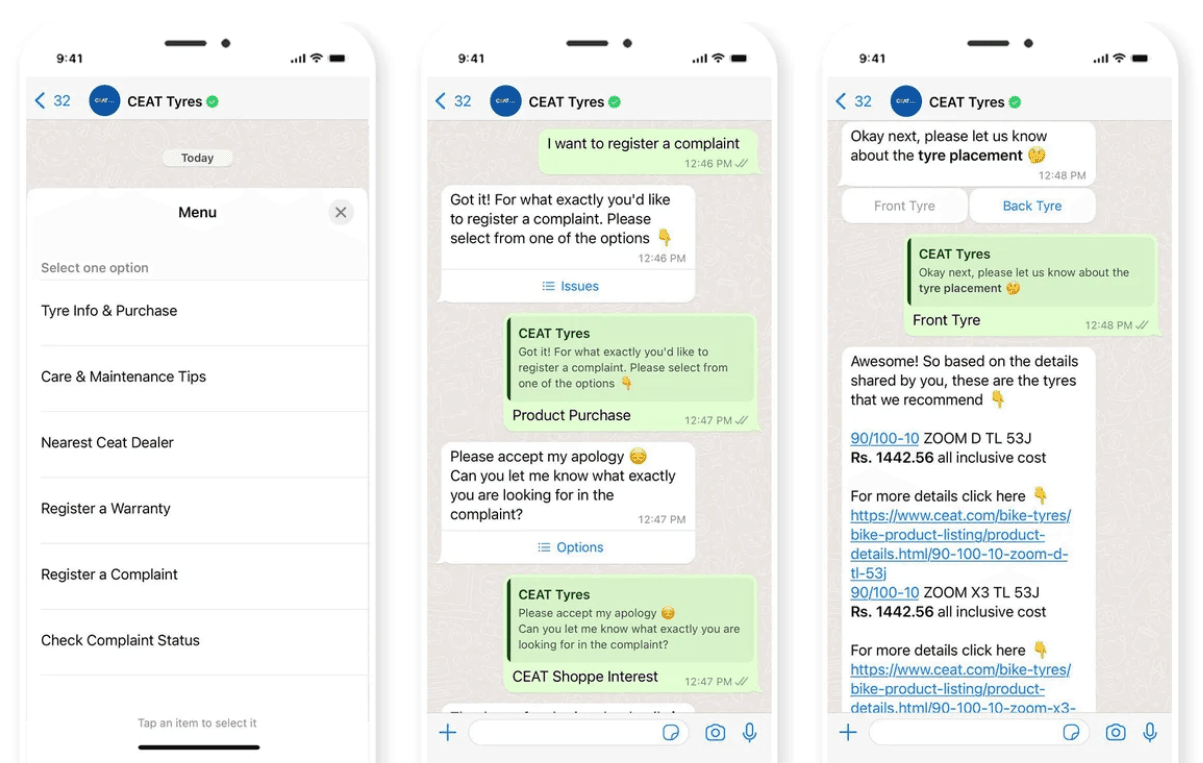
Source: Haptic
With the growth of technology, AI has changed how we interact with online platforms. Integrating AI technology in e-commerce platforms has brought remarkable changes and advancements that have completely transformed the online shopping experience.
The most noticeable impact of AI on e-commerce is its ability to personalize customer shopping experiences. With AI, e-commerce platforms can now analyze customers' browsing behavior, searches, and past purchases to offer tailored recommendations that align with their interests and preferences. This not only enhances customer satisfaction but also increases conversion rates for businesses. An AI system can provide complementary products to customers and match them with similar products based on characteristics like size, color, shape, brand, or fabric.
For instance, Pinterest enables users to choose a specific item from any internet image and then use image recognition technology to find comparable goods.
AI has also revolutionized delivery and logistics processes for e-commerce businesses. The technology has enabled intelligent forecasting and optimization systems that predict demand, reduce delivery times, and improve accuracy. With AI, businesses can optimize their inventory, lower delivery costs, and enhance the overall efficiency of their supply chain.
Furthermore, AI chatbots have taken over the customer service sector, replacing the traditional approach of human customer service that was often challenging to scale. AI chatbots are intelligent enough to respond promptly to customer inquiries, troubleshoot problems, and even provide product recommendations. They have significantly reduced response time, thus making customer interactions more convenient and improving satisfaction rates.
New Payment Options
To enhance the customer experience, businesses must recognize the importance of providing different payment options to cater to varying payment preferences. Besides traditional credit and debit cards, the online marketplace should also accept popular payment services like Google Pay, Apple Pay, and PayPal. These payment gateways can help businesses improve retention rates and increase repeat purchases.
By providing multiple payment options, e-commerce businesses can cater to customer preferences, including credit/debit cards, online payment platforms, bank transfers, and cash on delivery. Moreover, the availability of different payment options also gives customers a sense of security and trust as they can choose the payment method they feel most comfortable with. This, in turn, increases customer loyalty and helps build a positive brand reputation.
According to recent studies, merchants who offer multiple payment options have seen a significant increase in sales, with some reporting up to a 30% increase in revenue. This highlights the importance and effectiveness of providing customers with different payment options.
Blockchain
Blockchain technology has emerged as one of the most significant trends in the e-commerce marketplace development, and its impact on the industry has been nothing short of transformative. At its core, blockchain is a distributed ledger technology that enables secure and transparent transactions without intermediaries, such as banks or other financial institutions.
Accepting cryptocurrencies gives businesses several advantages, such as low transaction fees and zero reverse transactions. More importantly, it uses Blockchain technology, which makes digital payments more secure and almost eliminates any risks associated with fund loss. For example, Newegg, a huge e-commerce player specializing in electronics, has implemented Blockchain technology and now accepts Bitcoin as payment.
One of the critical advantages of blockchain technology is that it provides an immutable record of all transactions on the platform. This means that once a transaction has been recorded on the blockchain, it cannot be altered or deleted, providing a high level of security and transparency to users.
Another major advantage of blockchain technology is that it eliminates the need for intermediaries in the transaction process, allowing for faster and more cost-effective transactions. This is particularly important for e-commerce businesses, as it allows them to streamline their operations and reduce costs, ultimately leading to higher profits and better customer experiences.
In addition to its numerous benefits for e-commerce businesses, blockchain technology is also helping to address many of the longstanding challenges associated with online transactions. For example, blockchain can help reduce fraud and cybercrime by providing a secure and transparent platform for transactions while enabling greater privacy and data protection for users.
How can we help you achieve your digital goals?
Get in touchB2B E-Commerce Marketplace Trends in 2023
A B2B e-commerce marketplace is a digital platform connecting businesses with other businesses to facilitate buying and selling goods and services in bulk quantities. This platform provides a secure and efficient way for companies to network and transact with other organizations, streamlining their communication and business transactions in a centralized location.
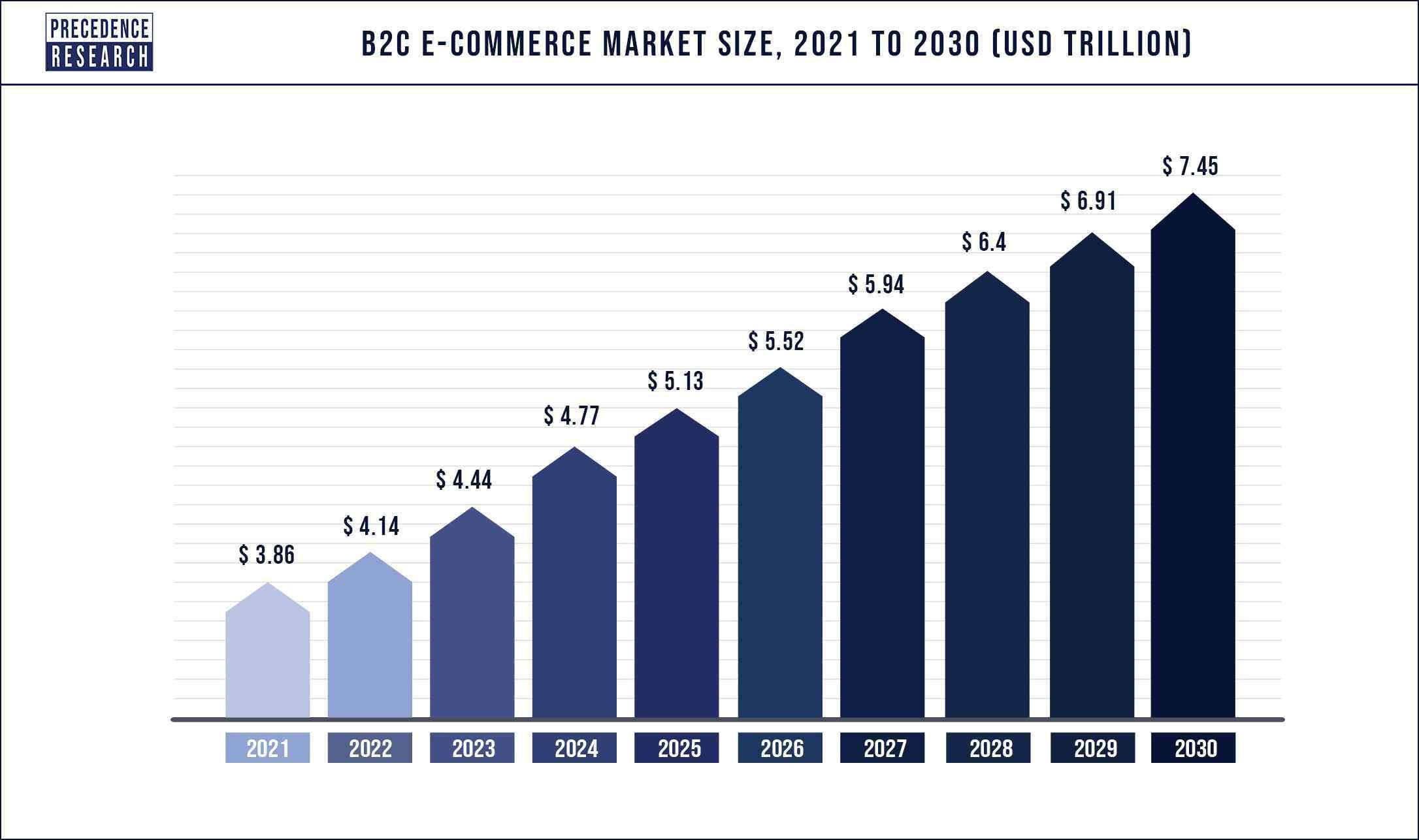
Source: Precedence Research
Unlike a B2C platform, such as Amazon or eBay, which caters to individual consumers, a B2B e-commerce marketplace is designed for businesses to conduct commerce among themselves. This type of platform enables businesses to find new suppliers, expand their customer base, increase their sales revenue, and optimize their supply chain operations.
The B2B e-commerce marketplace works by providing a range of features and tools that support the purchasing process. Such features include product catalogs, price lists, inventory management systems, quotation tools, and order tracking. These tools enable suppliers and buyers to manage their transactions from start to finish, from product discovery and selection to payment and delivery.
Moreover, a B2B e-commerce marketplace can offer additional services such as logistics and payment solutions, ensuring the seamless and secure delivery of goods and services for both parties involved in the transaction process. By providing these additional services, it can add value to customers' experiences and foster long-term relationships based on trust and reliability.
The following are the top trends that will continue to shape the industry in 2023:
- Personalization will remain king: Along with custom product recommendations and tailored customer experiences, B2B businesses will extend their personalization efforts to the delivery and shipping process, ensuring that customers always receive their orders on time and in the proper condition.
- An omnichannel approach is key: B2B buyers expect a seamless, cohesive experience across all channels, from online and mobile to in-person interactions. A company's ability to provide a seamless shopping experience across multiple channels will be a competitive advantage for years.
- Real-time inventory visibility: With the increasing demand for improved inventory management, B2B e-commerce websites must provide real-time inventory visibility to users. With this, businesses can be assured of accurate and up-to-date inventory management systems, ensuring customers can always purchase products in stock.
- Self-service buying portals: B2B e-commerce businesses that don't provide self-service buying portals risk giving their competitors an advantage. Online portals enable customers to buy what they need on their own time, without needing sales reps or phone calls.
- Social commerce is here to stay: The popularity of social media platforms like LinkedIn and Twitter means B2B buyers are increasingly purchasing from social media sites. In 2023, businesses will need to have a robust social media presence to survive.
- Focus on existing customers: In the next few years, B2B businesses will focus more on growing revenue by increasing the value of the existing customer base. Ensuring they are satisfied will be a priority, with regular communication, proactive support, and a range of personalized offers key to success.
- The rise of e-commerce marketplaces: B2B e-commerce sales via online marketplaces are set to grow exponentially over the next few years. These marketplaces offer many benefits, including wider access to potential customers, increased visibility, and the opportunity to sell a larger range of products.
- Efficient fulfillment: Given the growing demand for faster delivery times, businesses will need to focus on fulfillment efficiency to get goods to customers in record time. This will be an important factor in customer satisfaction and retention, with businesses opting for more efficient packaging, warehousing, and shipping solutions.
Final Word
From expanding the customer base to increasing revenue, optimizing efficiency, and serving as an additional source of income, creating an e-commerce marketplace solution is a wise investment for businesses looking to achieve long-term growth and success.
Do you need help developing your own e-commerce marketplace? We can help with that. We at Clover Dynamics create SEO-optimized e-commerce solutions for businesses of all sizes that are focused on excellent performance and a unique customer experience. Our offerings cover every facet of e-commerce development, from web scraping and warehouse automation to recommendation engines and AI-powered pricing solutions.
Let’s talk and see what we can do for you!







